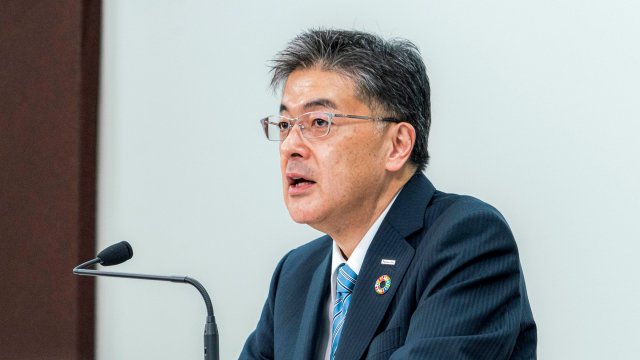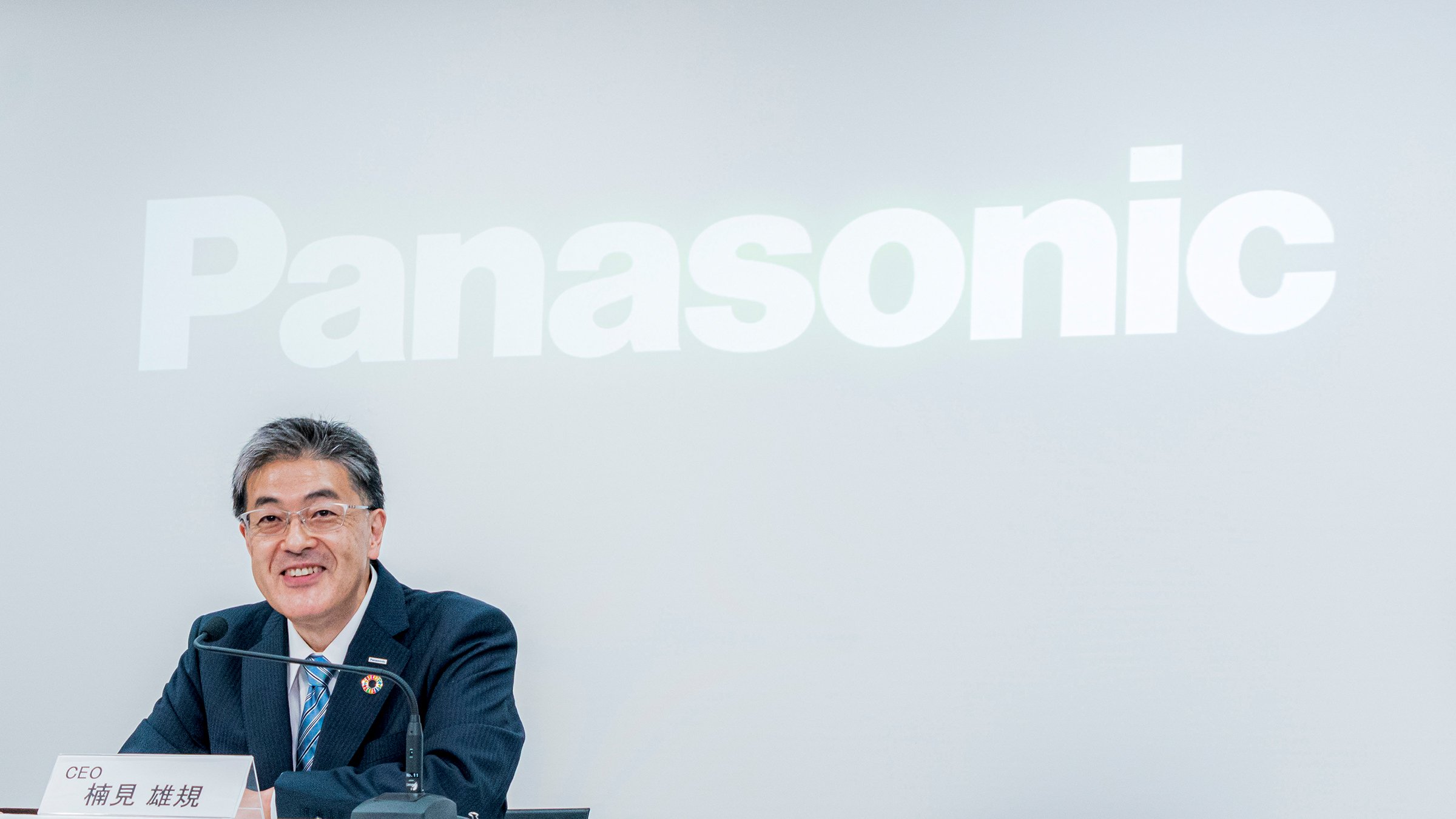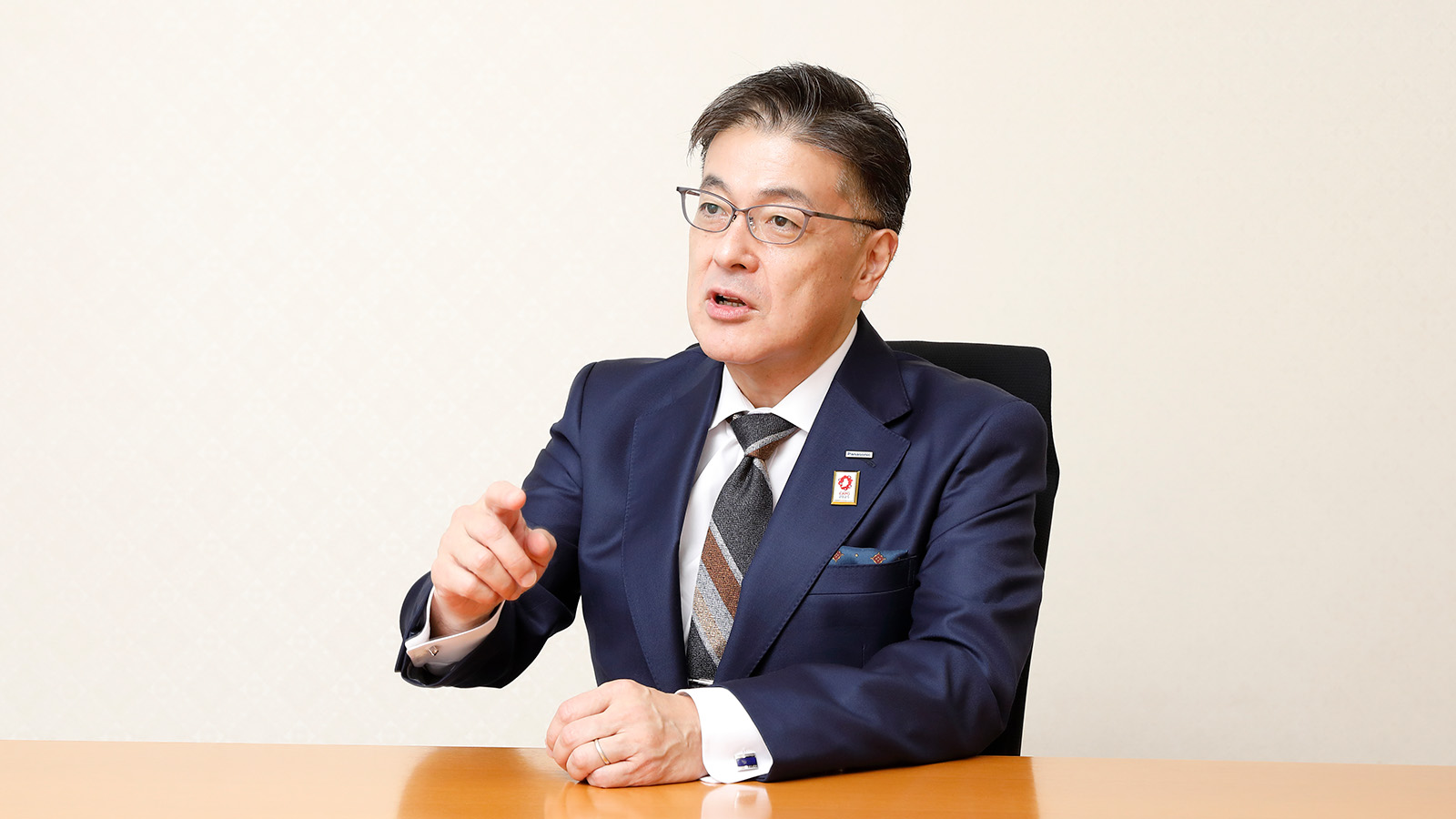
Zero Emissions Target Highlights Approach since Enactment of Matsushita Environmental Charter
30 years ago
Yuki Kusumi, CEO of Panasonic Corporation, outlined his leadership strategy for the organization during a media briefing on May 27, 2021. The briefing first focused on his management philosophy and its approach to addressing global environmental issues, and followed by an explanation of the strategy for enhancing competitiveness across Panasonic. Today we're going to take a look at the new CEO's management philosophy in the context of a rapidly changing society and the company's commitment to the environment.
Panasonic has been conducting business on a global scale for more than 100 years with a pursuit that dates back to its founder, Konosuke Matsushita, who aimed to realize an Ideal Society in which a plentiful supply of goods provides the foundation for mental and spiritual affluence, through contributing to the development of society and the advancement of world culture.
And now, the current CEO, Kusumi, said, "Despite living in affluent societies, too many people are consumed by worry and loneliness. When we think about the destruction of the natural environment, which seems to be accelerating year after year, and the exhaustion of natural resources, many of us are anxious about the future that our children, grandchildren and future generations will inherit. So the question is, 'How do we get back on the right track?'"
He believes that Panasonic must refocus its attention squarely on clarifying the realization of an "ideal society" that includes not only the satisfaction of material needs but also the enrichment of people's minds and committing the company's knowledge and experience to finding a new way forward. Tackling global environmental problems is very important in not only alleviating concerns right now but also in the future. "These efforts represent the true purpose of Panasonic--and are what our founder intended."
Panasonic and the Environment
Thirty years ago, in June 1991, Panasonic enacted the Matsushita Environmental Charter - becoming one of the first companies worldwide to describe its approach to global environmental issues and its responsibility as a public entity and member of society. Since then, Panasonic has been developing and implementing a variety of initiatives relating to prevention of global warming and promotion of resource recycling. The company is now focused on tackling environmental issues to become a company that can be proud of its record in this field.
"We can already see the impact of climate change due to increased levels of greenhouse gases, including CO2, around the globe. Combined with the issue of ever more scarce natural resources, we must acknowledge that the situation is critical," said Kusumi. "Our aim is to reduce energy used by our products and services--including factories and offices--and to produce more clean energy than we consume. Through these initiatives, we intend to achieve energy self-sufficiency and progress toward a sustainable society."
Panasonic has been addressing environmental challenges by evolving and improving its business activities and expanding its environmental initiatives in collaboration with stakeholders. Furthermore, by pursuing these activities, the company will be able to strengthen its own competitiveness.
"Efforts are being made at our factories and offices and through each of our businesses, for example, the Energy business is supporting the reduction of CO2 emissions from automobiles while the Gemba Process business leverages on supply chain efficiencies to reduce inventory losses and promote more effective logistics," said Kusumi. "We are reducing the environmental burden through products and services such as hydrogen fuel cells and the Air to Water business. Other initiatives include the promotion of recycling and reusing, and minimizing waste loss within the supply chain. Finally, we are contributing to more effective utilization of resources by promoting longer product lives by updating the products across their life cycles."
Zero-CO2 Initiative
Citing Panasonic's Environment Vision 2050--which commits Panasonic to creating more energy than it consumes--Kusumi announced a new commitment to reduce CO2 emissions to virtually zero at all operating companies by 2030. This Zero-CO2 initiative will be implemented from April 2022 in conjunction with the company's shift to a holding company system.
To achieve the target, Panasonic will accelerate three initiatives: to drive further energy-saving at each site; to implement renewable energy systems at each site; and to drive the procurement of renewable energy. In regard to the use of renewable energy at these sites, Panasonic will proactively promote the installation and use of solar power and hydrogen energy. In line with Panasonic's participation in the global Renewable Energy 100% or RE100 initiative, the ultimate goal for each site is to challenge and reach 100% reliance on renewable energy.
"To date we have established five Zero-CO2 sites, globally including Panasonic Eco Technology Center in Japan and Panasonic Energy (Wuxi) Co. Ltd. in China," explained Kusumi. "In addition, we will implement this initiative at the Smart Energy System Business Division's Kusatsu Factory, which begins full-operation in April 2022."
The road to RE100 includes a number of challenges--from the sourcing of renewable energy (in-house generation or external procurement) to the type of power generation system being used. For example, photovoltaic power generation faces two key challenges: a wide installation area and susceptibility to weather. Panasonic is seeking to resolve these issues by developing a solution that combines photovoltaic generators with pure hydrogen fuel cell generators and storage batteries. The Kusatsu Factory in Shiga Prefecture will be the first in the world to seek to achieve an RE100 rating through full-scale use of hydrogen.
Image of the Kusatsu Factory, which will feature an in-house power generation system combining pure hydrogen fuel cell generators (500 kW), photovoltaic generators (approx. 570 kW) and lithium-ion storage batteries (approx. 1.1 MWh)
"Using the Kusatsu Factory as a platform to test and evolve our capabilities in the RE100 solutions business, we will proactively introduce similar projects at other Panasonic sites," said Kusumi. "We look forward to delivering these advanced solutions to customers and to deepening our contribution to the fight against climate change."
# # #
Disclaimer:
We would like to note that Panasonic Newsroom is not a place to address personal Customer Service issues. Even though this is not the forum, Panasonic is always eager to resolve your concerns. Our local customer services contacts can be found at Global Support or you can see our list of Social Media Accounts to find the right channel for your queries and concerns.
Related Links
Related News
- [Press Release] Panasonic to Demonstrate RE100 Solution Using Pure Hydrogen Fuel Cell Generators (May 24, 2021)
- [Press Release] Panasonic Environment Vision 2050: Panasonic Realizes Its First Zero CO2 Factory in China (Apr 6, 2021)
- [Press Release] Panasonic Realizes Its First Zero-CO2 Factories at Two Sites in Japan and Europe under 'Panasonic Environment Vision 2050' (Feb 28, 2019)








